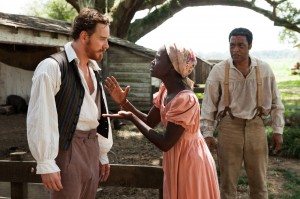A slave is being hung by the neck in the backyard expanse behind a proper Southern manor. He is alive and able to keep himself that way – barely. The rope allows him to tiptoe in the mud just high enough to allow periodic gasps of air. He cannot possibly last in this position. The vision is accented not by its jarring reality, but instead by its mundanity. The slave has been saved from a proper hanging, but the overseer who chased away the lynch mob didn’t bother to cut the rope. As the scene prolongs, other slaves appear from their hovels. They don’t look. They don’t comment. They go about their daily lives deliberately avoiding the corpse-to-be as if the mere acknowledgment will create a similar fate. Of course, in 1840s Louisiana, it might. One sympathetic house slave finally races out and shoves a can of water to the lips of the hanging man. He sputters and spits thankfully and she races away. Don’t get involved. Life is cheap among the not-so-hired help.
Even those of us who allow ourselves to think about slavery and what actually occurred in American history generally have a very one-sided view of what went on. It is easy to imagine that all slave owners are cruel sadists and all slaves yearned for freedom at all costs. 12 Years a Slave dispels both notions while telling the tale of a northern free man, Solomon Northup (Chiwetel Ejiofor) cheated and sold into slavery in 1841, who did indeed yearn for freedom at all costs and was subject to a very cruel and sadistic slave owner (Michael Fassbender).
On the boat headed for the bayou, Solomon watches his potential escape plan blow up in smoke when another cheated man is murdered. Then he and we both get a very good idea of what it is to be property. He steps off the boat in chains and is immediately given the name “Platt” on the spot. When he objects, the middle man (Paul Giamatti) slaps him, hard. Then we get a rare treat … a glimpse into a slave auction house. In the back, men and women are forced to strip naked and wash. No privacy, no modesty. In the house, some get to wear clothes, others … less. Teeth are checked, backs are checked (no scars = docile, subservient), a boy is forced to run in place on command. Platt is fortunate. Being a skilled violinist, he is something of a scarcity; his talents won’t be limited to the field. He immediately snapped up by a well-meaning slaver (Benedict Cumberbatch), but a slaver nonetheless. His life will be (relatively) good until he realizes he hasn’t the luxury of defiance.
Each slave has his own point of view. As outside observers to the age, we rarely see that, pretty much, ever. Alfre Woodard plays a former field slave who sees freedom in playing the game; she becomes a mistress and enjoys fruit juice, shade and fine clothes. Give The Devil exactly what he wants and life might not be so bad. The real standout is Lupita Nyong’o as Patsey, a slave so fearful of the lash she works thrice as hard as her peers. They are competition, you see, as the cruel master whips the poorest performers every evening (or at least such is suggested).
Once a man has been broken, there’s very little need for beating him. And at that point, he is damaging what any slaver would consider is his own property. Even the most sadistic of slave owners would see the wisdom in that. I have no doubt that whippings happened on a regular basis, just without quite the frequency as implied. Beating the low man on the totem pole every.single.evening strikes me, in context, the same as a modern day couch potato taking a hammer to the clicker that failed him most often at the end of the daily TV session. There’s a point at which  your actions are not only inhumane, but foolish and short-sighted as well.
your actions are not only inhumane, but foolish and short-sighted as well.
That being said … no man who can look another in the eye and treat him as property deserves the benefit of the doubt. I believe without question this cruelty happened in expression and scope. I say here that the details were not wrong, but condensed for the sake of dramatic interpretation. A man who feels the lash every day probably won’t be ambulatory by the end of the month.
And there you have 12 Years a Slave. It’s not an easy movie to watch. I’m glad of that. The only thing worse than making another man a slave is the treatment given to the slaves themselves. No part of this process resembles anything but the worst humanity has to offer. I can’t say I was wild about Chiwetel Ejiofor’s acting – I often couldn’t tell what he was thinking or what kept him going. And yet, to me it matters little. The fact is Solomon Northup did keep going on the microscopic chance that one day he would return to his wife and family. The saddest part is the millions, literally, who didn’t even have that microscopic chance.
Sold to The Devil
Beaten into submission
Where does hope come from?
Rated R, 134 Minutes
D: Steve McQueen
W: John Ridley
Genre: Our shameful past
Type of person most likely to enjoy this film: Justice seekers
Type of person least likely to enjoy this film: “Tell, don’t show”



